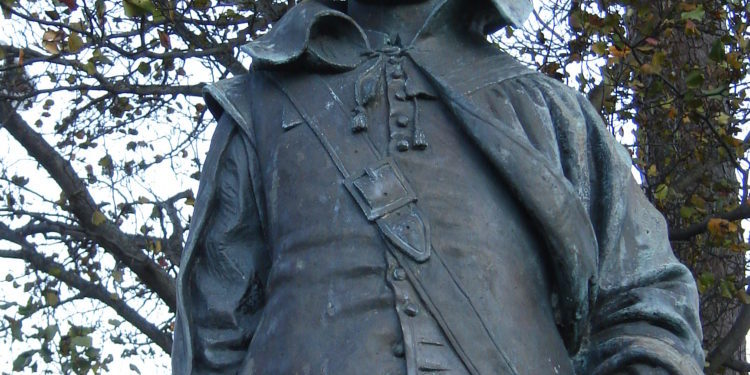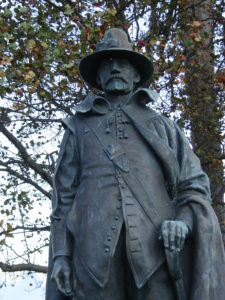 “From my years in days of youth, God did make known to me his truth. And call’d me from my native place, for to enjoy the means of grace. In wilderness he did me guide, and in strange lands for me to provide.” So wrote William Bradford about his youth in one of his many poems. Based on baptismal records William is presumed to have been born in Austerfield, Yorkshire, England in March of 1590. Before turning 6 he lost both his father and mother, and was raised by his uncles. A long sickness kept him in bed for years as a child and later Bradford wrote that this “kept him from the vanities of youth.” He was drawn to know God by the reading of the Scriptures by the time he turned 12. His desire was to go to a “separatist meeting” in Babworth, but it was eight miles away from his home in Austerfield.
“From my years in days of youth, God did make known to me his truth. And call’d me from my native place, for to enjoy the means of grace. In wilderness he did me guide, and in strange lands for me to provide.” So wrote William Bradford about his youth in one of his many poems. Based on baptismal records William is presumed to have been born in Austerfield, Yorkshire, England in March of 1590. Before turning 6 he lost both his father and mother, and was raised by his uncles. A long sickness kept him in bed for years as a child and later Bradford wrote that this “kept him from the vanities of youth.” He was drawn to know God by the reading of the Scriptures by the time he turned 12. His desire was to go to a “separatist meeting” in Babworth, but it was eight miles away from his home in Austerfield.
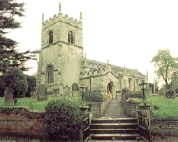 As a young teen, Bradford walked the eight miles to church. His uncles did not delight in his desire to attend an underground, illegal church meeting of people who had separated from the Established Church of England. After all, you could be arrested for doing so, and neighbors were encouraged to turn in the names of those who they thought were engaging in such a practice. The path Bradford walked is now called the “Pilgrim Pathway.” It was here in Babworth that Richard Clyfton guided young William to respond to the Scriptures and convert to the Christian faith.
As a young teen, Bradford walked the eight miles to church. His uncles did not delight in his desire to attend an underground, illegal church meeting of people who had separated from the Established Church of England. After all, you could be arrested for doing so, and neighbors were encouraged to turn in the names of those who they thought were engaging in such a practice. The path Bradford walked is now called the “Pilgrim Pathway.” It was here in Babworth that Richard Clyfton guided young William to respond to the Scriptures and convert to the Christian faith.
Bradford soon desired to join the Separatist Church, but his uncles would have no part of it. In fact, they threatened that if he did so, he may be disinherited from all his parents had saved for him and could no longer stay with his relatives. Bradford’s response to them at age 14 demonstrates his conviction to follow his conscience in his devotion to Christ. “…To keep a good conscience, and walk in such a way as God has prescribed in his Word, is a thing which I must prefer before you all, and above life itself… I am not only willing to part with every thing that is dear to me in this world for this cause, but I am also thankful that God has given me an heart to do, and will accpet me so to suffer for him.”
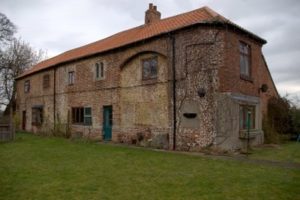 William did leave the care of his relatives and soon moved in with William Brewster where the Pilgrim Church met secretly. Scrooby Manor was a place where riders would stop and deposit their mail. As Post-Master General to the Queen, Brewster’s position would soon be threatened due to the underground Pilgrim Church. Young William was likely one of the youth who played games in the street but listened intently to find out if people were talking about the secret meetings so they could be re-scheduled or staggered. Soon it became evident that Brewster would have to resign his position and the Pilgrim church would have to consider relocating in the Netherlands where he had visited and saw firsthand their greater religious toleration.
William did leave the care of his relatives and soon moved in with William Brewster where the Pilgrim Church met secretly. Scrooby Manor was a place where riders would stop and deposit their mail. As Post-Master General to the Queen, Brewster’s position would soon be threatened due to the underground Pilgrim Church. Young William was likely one of the youth who played games in the street but listened intently to find out if people were talking about the secret meetings so they could be re-scheduled or staggered. Soon it became evident that Brewster would have to resign his position and the Pilgrim church would have to consider relocating in the Netherlands where he had visited and saw firsthand their greater religious toleration.
King James would not allow the Separatists to leave the Church of England, but he also did not want them to successfully escape, promising to “harry them out of the land, or do worse.” Sixteen year old William was there when the Pilgrim Church ratified their covenat in Scrooby; “As the Lord’s free people joined themselves (by a covenant of the Lord) into a church estate, in the fellowship of the gospel… whatsoever it should cost them.” Bradford added “And that it cost them something this ensuing history will declare.” It was their covenant that gave them the strength to endure the wrath of King James.
Seventeen year old William was a part of the group of leaders who were arrested when first attempting to leave England for Holland. He spent time in jail cells with Robinson, Brewster, and others. William was eighteen when the women and children were taken into custody attempting to escape; he was with the men on the ship that had to sail in away and watch in agony as wives and children were taken by soldiers. The voyage was nearly shipwrecked, being blown to Norway before finally making it to Amsterdam. The men would eventually be rejoined to the women and children several months later.
William married Dorothy in 1613 and they had a son John in 1617. They were a part of a church that grew to over 300. Bradford summarized the main reason this church remnant would decide to sail to the new world; “A great hope and inward zeal they had of laying some good foundation… for the propagating and advancing the gospel of the kingdom of Christ in those remote parts of the world; yea, though they should be but even as stepping-stones unto others for the performing of so great a work.”
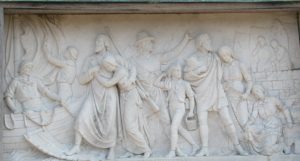 William and Dorothy made the difficult decision to leave John behind at only three years old. They were not alone and thus the Embarkation painting depicts the sadness for so many families. Many would not see family members again. When the only ship the Pilgrims owned, the Speedwell, sprung leaks and had to be abandoned, Bradford wrote “And thus, like Gideon’s army, this small number was divided, as if the Lord by this work of His providence thought these few too many for the great work He had to do.”
William and Dorothy made the difficult decision to leave John behind at only three years old. They were not alone and thus the Embarkation painting depicts the sadness for so many families. Many would not see family members again. When the only ship the Pilgrims owned, the Speedwell, sprung leaks and had to be abandoned, Bradford wrote “And thus, like Gideon’s army, this small number was divided, as if the Lord by this work of His providence thought these few too many for the great work He had to do.”
William was part of the party that first landed in Provincetown, then explored for 30 days before being shipwrecked on Clark’s Island and finally landing on Plymouth Rock December 11, 1620. He did not know that his wife, Dorothy, had fallen overboard four days earlier in Provincetown Harbor and drowned. What a price he paid! Though he would eventally marry Alice Southworth in 1623 and have two more sons (Major William and Joseph) and a daughter (Mercy), his dual legacy involved both his own children as well as the ideas and various roles he played in overseeing the seed of self-government in our nation at Plymouth now called America’s Hometown.
William served as Governor almost every year of his life from age 30 to over 57 when he died. He governed by the rule of law yet with mercy. He was also a scholar, having taught himself Dutch, French, Latin, Greek and Hebrew where he continued his studies in the wilderness. He left a legacy as an historian, not just penning the facts, but of doing so in a style that continually pointed out the intervention of God and His Providence in the lives of the Pilgrims and those who came with them.
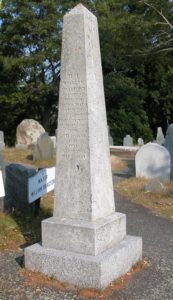 On the day before he died he told his friends “That the good Spirit of God had given him a pledge of his happiness in another world, and the first-fruits of his eternal glory.” He passed in the Spring of 1657 and his legacy among those who knew him or knew of him is best summarized by Cotton Mather who wrote “The leader of a people in a wilderness had need of a Moses; and if a Moses had not led the people of Plymouth Colony, when this worthy person was their governor, the people had never with so much unanimity and importunity still called him to lead them… Men are but flocks: Bradford beheld their need. And long did them at once both rule and feed.”
On the day before he died he told his friends “That the good Spirit of God had given him a pledge of his happiness in another world, and the first-fruits of his eternal glory.” He passed in the Spring of 1657 and his legacy among those who knew him or knew of him is best summarized by Cotton Mather who wrote “The leader of a people in a wilderness had need of a Moses; and if a Moses had not led the people of Plymouth Colony, when this worthy person was their governor, the people had never with so much unanimity and importunity still called him to lead them… Men are but flocks: Bradford beheld their need. And long did them at once both rule and feed.”

